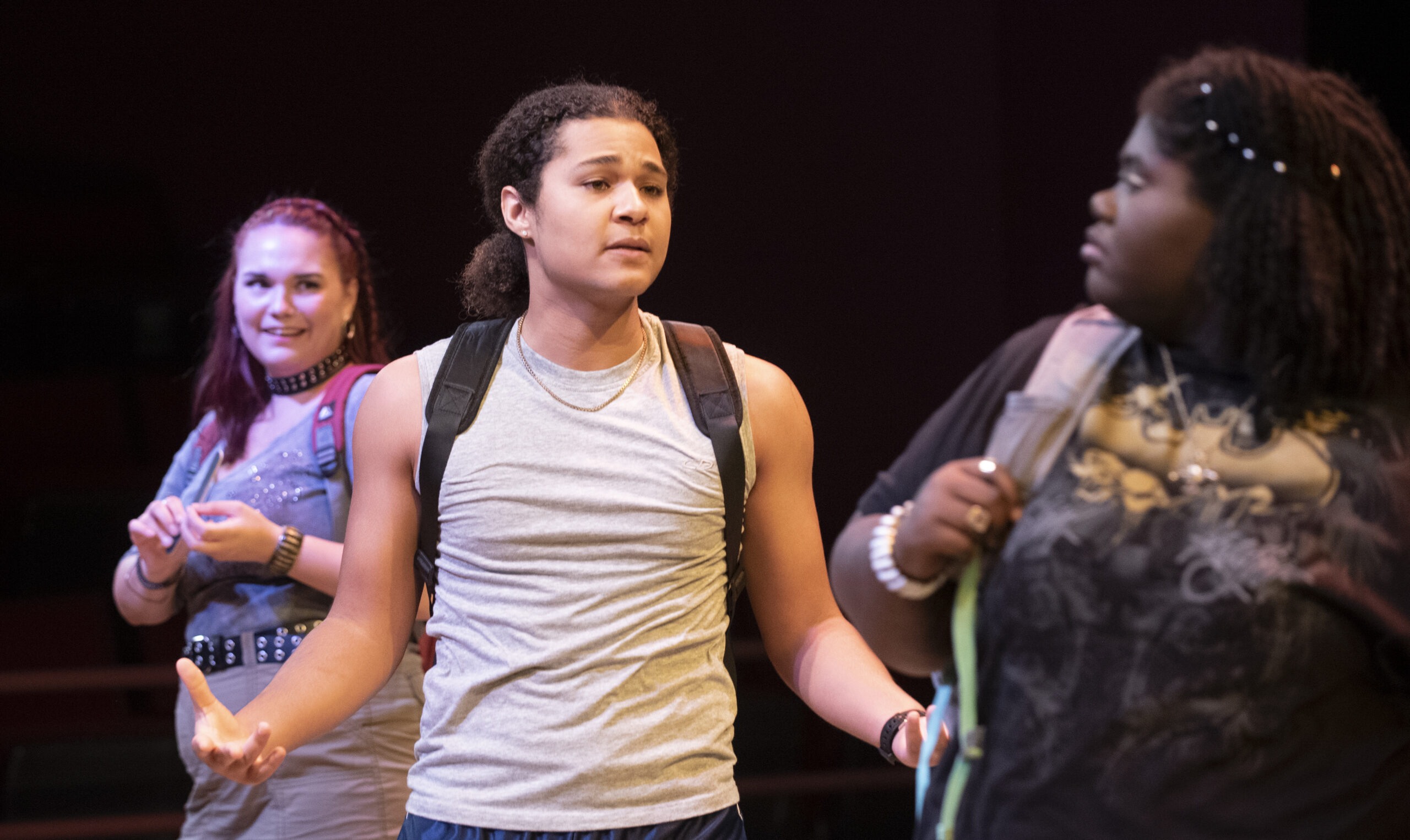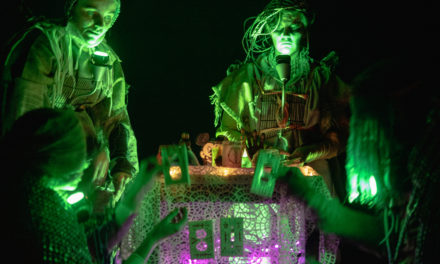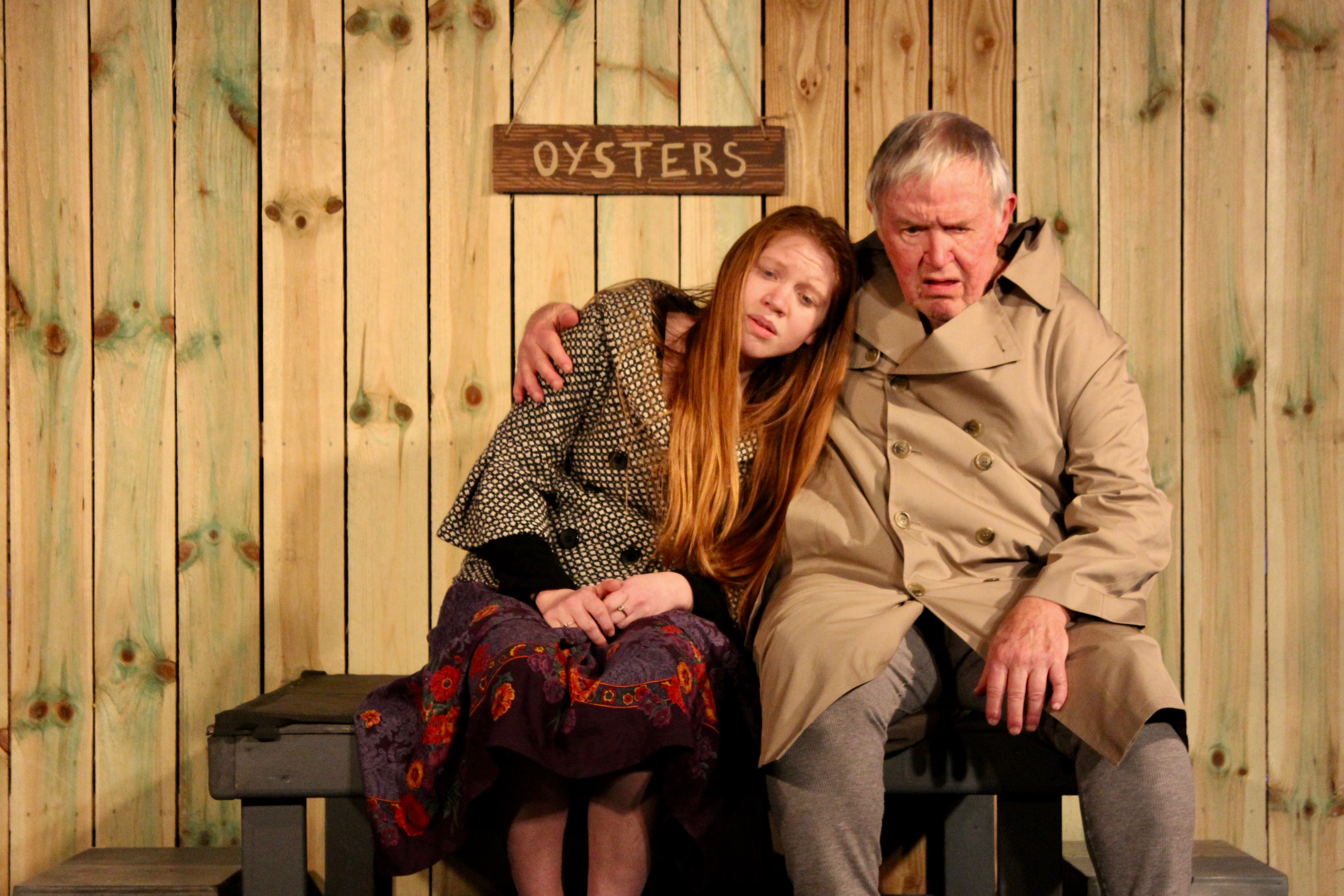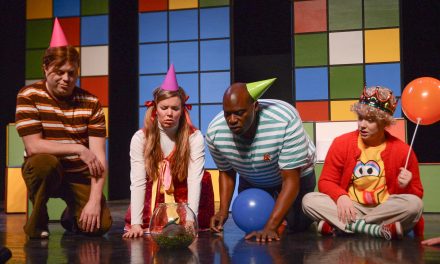Sarah Chen Elston, Nick Wills, & Latrice Richardson in Blood At The Root. Photo: Tom Fougerousse.
Blood At The Root
By Dominique Morriseau
Directed by Nefertiti Burton
A review by Keith Waits
Entire contents are copyright © 2022 by Keith Waits. All rights reserved.
In my opinion, Dominique Morriseau is one of the most important American playwrights working today, and I’m confident I’m not alone in that view, so I was excited to have the opportunity to experience another of her earlier works after the African American Theatre Program production of Detroit ‘67 in January 2020.
Even though it was written later than that play, Blood At The Root sounds like the blunter, more pedantic voice of a new playwright that points to the more masterful Skeleton Crew or Pipeline. That aspect may owe much to the youth of its characters, individuals coming of age and forming their first view of the world, or perhaps it is inherent in the real-life incidents that inspired it. Three rope nooses are hung from a tree on the grounds of a Louisiana high school after Black students sat beneath the tree which had been the territory of popular White students.
In Morrieeau’s story, Raylynn (Latrice Richardson), is a Black student who bucks the odds by running for senior class President. Her close friend Asha (Sara Eslton), is a White girl who has always felt deeply connected to her Black friends and her brother De ‘Andre (Nick Wills), is a star football player looking for a college athletic scholarship.
Somewhat improbably Raylynn befriends Colin (Nick Gabis), a White transfer student and the new quarterback. Despite the privileged position of star athlete, Colin relates to Ratlynn’s more questioning worldview.
Meanwhile, school paper editor Justin Tajleed Hardy) and ambitious and combative reporter Toria (Sarah Stewart), engage in ethical debates about the responsbility of journalism and if truth is better conveyed through objectivity or a committed point-of-view.
So the stage is set for speeches and polemics on issues that have forever and will forever be part of our society. To her credit, Morriseau moves past some of the more obvious and frequent points to explore some more subtle questions of identity. When Asha declines to join in a protest around the tree, Raylynn derides the convenience of her identification with Black sensibility, calling out her ability to, “…put it on and take it off whenever you want.” And Justin is pushed to the limit by Toria’s self-righteous idealism to the point of an emotional breakdown about his refusal to live according to the expectations of others. Both are powerful moments that may force audience members to take a harder look at themselves.
There is a good cast here, but much of the impact comes from the design work, with Kevin Gawley’s lighting & projections establishing a unique scenic design encompassing a large tree with roots that spread out across the stage towards the audience, and Sa’id ”Nxxtime” Kelly’s music design that builds off of a cover of the Billie Holiday classic “Strange Fruit” in a fashion that feels as if the recording was created just for this production. Exactly how Scenic & Sound Designer Jerome Wills fits into this collaboration is harder to suss out, but it is exemplary work by all three.
Much of the vernacular Morriseau employs requires work to sound natural, and there is a decidedly mixed result among the ensemble on this point. But Latrice Richardson holds a firm center as Raylynn, Sara Elston makes sense of Asha’s improbable position, Tajleed Hardy intelligently articulates Justin’s submerged sense of self, and Nick Wills has a particularly fine moment when De ‘Andre powerfully expresses himself in poetic fashion. Identity is the center off the story, these characters coming of age in a struggle to discover the person they wish to be, and how conflicts with others forge that identity. Nick Gabis struggles a bit with Colin’s own individual search, but he effectively connects with Richardson to round out the circle.
Blood On The Root differs from Morriseau’s other plays in tying itself to a real-life incident. Although this not a docu-drama, whatever faith she holds with the origin story limits her in building a narrative as rich and evocative as Skeleton Crew or Pipeline in part because of the youth of the characters. They lack the experience of the people who inhabit those plays, but the playwright cannily recognizes the ignorance and niavete that allows acts of hate and violence to result. When Asha and others argue that the nooses is just a stupid prank, missing the racist association, then the crucial importance of understanding history comes clear.
Featuring Khristian Davis, Sara Elston, Nick Gabis, Tajleed Hardy, Nyazia Martin, Latrice Richardson, Jasmine Smith, Sarah Stewart, Katie Swain, Jackson Tucker, Nick Wills.
Blood At The Root
September 23-29, 2022
University of Louisville Dept of Theater Arts
U of L Playhouse
1911 South Third Street
Louisville, KY 40292
louisville.edu/theatrearts
Keith Waits is a native of Louisville who works at Louisville Visual Art during the days, including being the host of LVA’s Artebella On The Radio on WXOX 97.1 FM / ARTxFM.com, but spends most of his evenings indulging his taste for theatre, music and visual arts. His work has appeared in LEO Weekly, Pure Uncut Candy, TheatreLouisville, and Louisville Mojo. He is now Managing Editor for Arts-Louisville.com.





